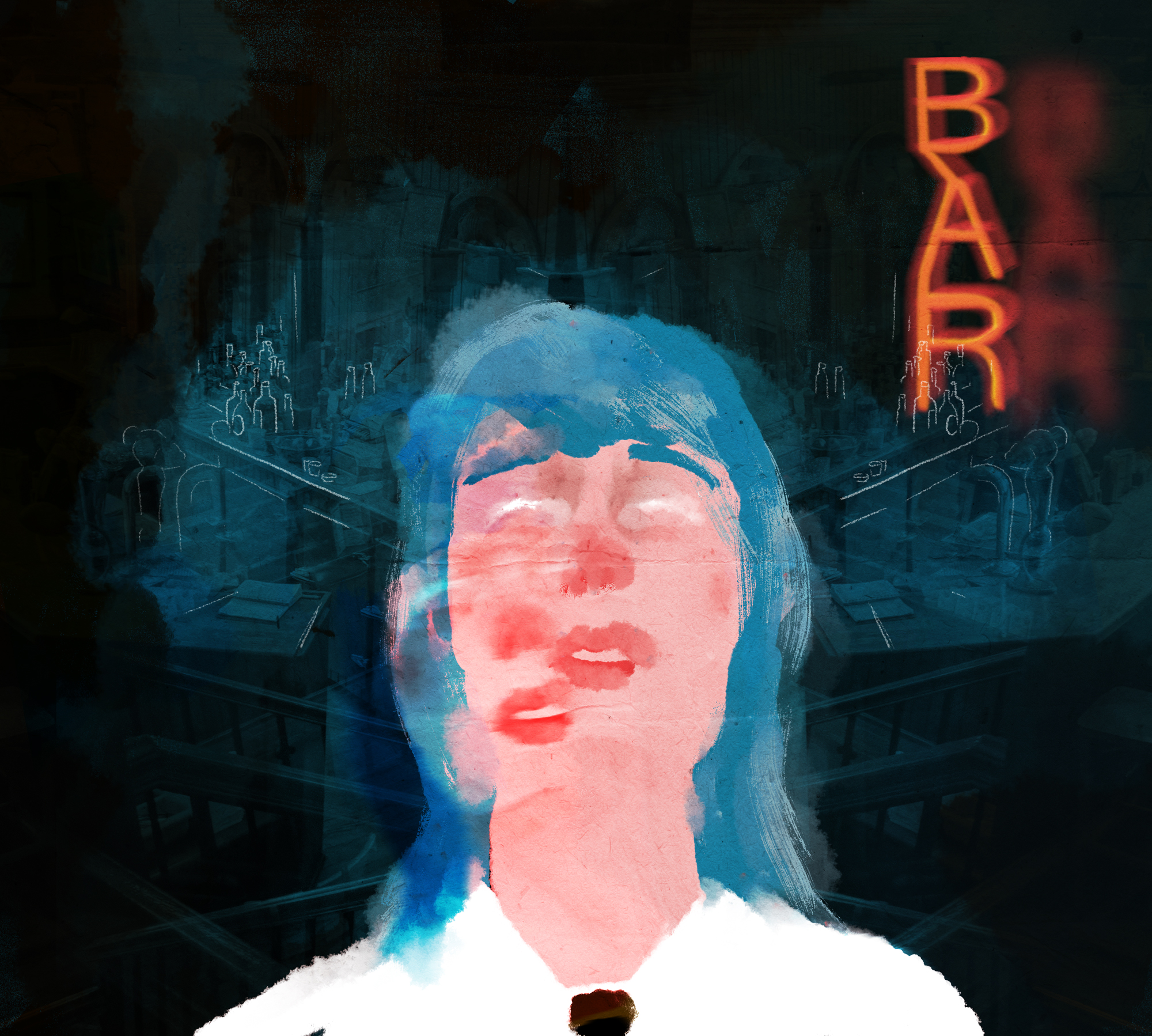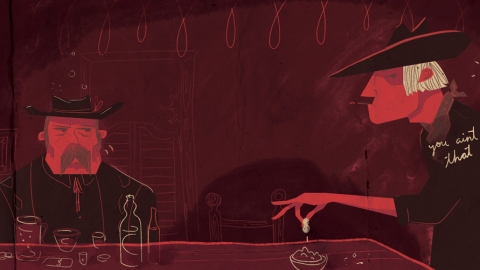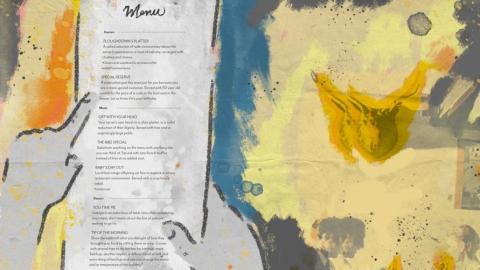Dark Meat
Substance Abuse: It's not the industry, it's you.
There is none of the drunken lustre of nights past on a Sunday afternoon at Chez Lucien. The ByWard Market bistro and bar, home to throngs of hill staffers and a revolving cast of downtown denizens, has long been a welcome reprieve for those of us in the industry, where it is easy to disappear off the map of the gastrocracy and into an anonymous fray.
But on this particular afternoon, our kith found the place ideally sparse and subdued. We converged under its inconspicuous signage, a red fluorescent “BAR” sign alight over the side-street front door, a beacon for service staff to stagger towards after a long shift — where legend has it one could get sufficiently blottoed at one of their notorious lock-ins long after the bellowing of last call.
But today we weren’t looking to tie one on.
A small group of us gathered to honour a friend — one of Ottawa’s finest servers — who had recently succumbed to an overdose, a victim of his own self-abuse. We grabbed a table in the upstairs gallery, next to the two-piece jazz outfit; they gave the well-worn jukebox a much-needed rest and our strained talk some much-needed relief. We ordered a round and sought to understand how one of our own could have slipped through the cracks with such finality.
There were no shortage of theories. Some of us felt that he was partying more than usual, while others felt he had actually cut back. He was known to use drugs on occasion (as were many of us) — but his real penchant (as for most of us) was for the drink. As we sat around sipping our pints and bloody caesars, I felt the palpable unease in all our speculating — it was hard to ignore the irony of toasting his life with the very substance that had been his destructive force.
As industry staff, we’re hardly expected to be teetotalers. The transgressions of Ottawa’s culinary titan, Matthew Carmichael, would hardly have registered in the public’s mind had he merely done a stint in rehab. It was the fact that he had abused others, and not just himself, that led to such disgust and dismay. There’s nothing shocking about a chef or food service worker with a drug and alcohol problem, even though substance abuse continues to hollow out the service industry, where we accept excessive lifestyles as the norm.
But why is it such a defining feature? What perils do we face in hospitality that others do not?
High stress? Absolutely — but heart surgeons and daycare have high-stress jobs. We may face intense pressure and scrutiny on an everyday basis, but we can hardly claim to be the only industry that does.
Access to booze? Last call is something of a mirage when you’re in charge of locking up, and it’s easy to tipple now and then when the bar is in arm’s reach. But only a few staff members have this sort of proxy to allow them that privilege.
Is it that our workplaces lack policies and procedures that protect staff from taking it too far, too often? Many will do just the opposite. I remember, on one of my very shifts in the industry, my boss poured shots down my throat. I was working in one of those monstrous pub-style restaurants you find in a parking lot in the suburbs, the kind that draws in a slew of buffoons from all the nearby boroughs and country hamlets, primed to get wasted. In the middle of the Friday night frenzy, I felt a tap on my shoulder as I balanced a tray loaded with sloshing glassware above my head. It was the boss telling me to get back to the bar. “But what about all of these orders?” I asked. “Doesn’t matter. Just go,” he said.
I negotiated my way through the crowd and felt myself being lifted on top of the bar by one of the doormen, where I found myself in a chorus line of service staff, each of us attempting a precarious two-step for the hooting masses. Before I knew it, I was holding my mouth agape as my boss passed by with a bottle of raspberry sour-puss. It was a sugary kick to a long night of heavy drinking, the first of many drinks that would be poured for me that night by management. That said, the blitz didn’t really get underway until we had a lock-in of our own.
Granted, a shameless riff on Coyote Ugly is not the norm, but encouraging staff to imbibe, whether on or off the clock, certainly is. Offering staff a drink on the house at the end of service is considered a benign custom and to withhold the postshift carrot would be in poor taste. But the line between a few drinks after work with your teammates and perpetuating abuse is hazy at best and expecting any sort of decree of temperance from the top is unlikely. Managers are often poor examples, having climbed out of the trenches to find themselves in a position of more responsibility and less pay, often justify their own need for a drink by encouraging their staff to do so. (Case in point: any given Sunday, I would rally my troops at Wilf & Ada’s for a shot of something stiff to get us through the final brunch push. Some of my staff refused, but my cup was never dry.)
And it’s not just among our workplace intimates. The libations extend into the "other" family; the paean offered to the legions of our fellow industry workers in the way of shots of Wild Turkey and Jameson, often without warning. We find ourselves in awkward situations where turning down a drink beleaguers us with questions of etiquette.
This is how we really get into trouble — as employers, managers, co-workers, friends — by enabling and celebrating indulgence, and ignoring any evidence that someone who is struggling could be hiding in plain sight.
The last time I saw my friend, we shared a bottle of wine on my front stoop. I hadn’t thought anything of it. Frankly, one bottle of wine between the two of us was nothing. Our friendship struck up at a staff party many years ago, where we found ourselves keeping a rapid pace with one another. We wound up at Chez Lucien that night and kept the night going until it wasn’t night anymore. Over the years there were no shortage of overindulgences between us, but we had aimed to balance the party with the professional. We signed up for wine courses, discussed food and restaurant trends ad nauseum and charted our careers in step. We pushed each other to be better at our jobs and tried to find footing in an industry known to tip many overboard. And we egged each other on with drink and drug, not realizing that the excess we tended to stemmed from something deeper and darker.
This is our ongoing failing in the hospitality industry: not recognizing the self-abuse among our nearest and dearest, or upturning our noses at the whiff of a problem, so as not to put a damper on the party. We slow-clap for those who have found help and gotten clean, but winding up in rehab is the second-to-last stop away from the industry. How many more must we lose, not just those who have carved a path away from a proclivity for the drink and all of its illicit accoutrements, but those who were unable to find help in the first place? When will we see substance abuse for the illness that it is?
After a couple of rounds at Chez Lucien, we paid our bills, tossing a few bucks together for Serenity Renewal, a local recovery organization recommended by a friend and former server who had found their own salvation with the help of their services. We offset some our grief this way, but as we headed off to work at restaurants and bars across town, I suspected we had again relieved ourselves of responsibility, for both those we had lost and the abuse that haunts our holy houses of hospitality. Bracing ourselves for another night of service and the inevitable thirst to creep in, we think: “I’ll be needing that drink tonight.”








